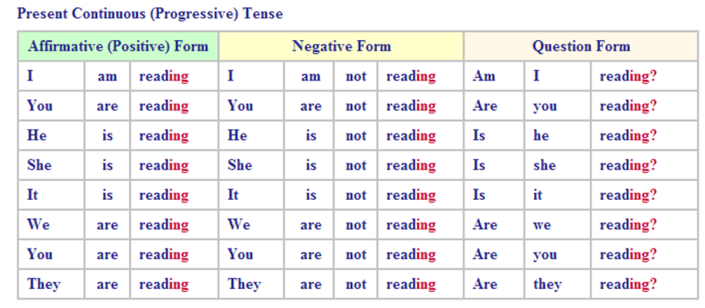Grammar Focus:
USES:
We use the present progressive or continuous tense to talk about:
- actions happening now or at the moment of speaking.
- actions happening for a short period of time.
- actions taking place in a near future.
SIGNAL WORDS
- at the moment
- now / just now / right now
- Listen!
- Look!
STRUCTURE

SPELLING RULES
1. Verbs that end with one -e, drop the -e and add -ing. Note that these verbs the -e sound at the end is silent. (e.g., believe, bake, take, move).
- achieve — achieving
- live — living
- take — taking
- strike — striking
- bike — biking
- make — making
- have — having
- dance — dancing
Verbs ending with a long -e sound, add -ing as you normally would.
- see — seeing
- be — being
- flee — fleeing
- agree — agreeing
2. Short one-syllable verbs ending in CVC (a consonant + vowel + consonant), we double the final consonant before adding the -ing ending:
- sit — sitting
- get — getting
- pet — petting
- plan — planning
- run — running
- put — putting
- stop — stopping
- trim — trimming
- win — winning
Notice these verbs end in CVC (consonant vowel consonant). However, do not double the consonant for verbs that end in w, x or y.
Verbs ending in w, x and y
- blow — glowing
- row — rowing
- snow— snowing
- stay — staying
- tax — taxing
- play— playing
3. When verbs ending in ending in CVC (consonant vowel consonant) have two or more syllables, double the last consonant if the last syllable is stressed.
- begin — beginning (be / GIN = the last syllable is stressed)
- forget — forgetting (for / GET = the last syllable is stressed)
- upset — upsetting
- regret — regretting
- prefer — preferring
- admit — admitting
However, when the last syllable is not stressed, just add -ing as usual.
- benefit — benefiting ( be / NE / fit = second syllable is stressed not the last)
- happen — happening (HAPP / en = first syllable is stressed not the last)
- open — opening
- listen — listening
4. Verbs ending in -ie . If a verb ends in -ie change 'ie' to 'y' then add -ing.
- die — dying
- lie — lying
- tie — tying
________________________________________________________________________









